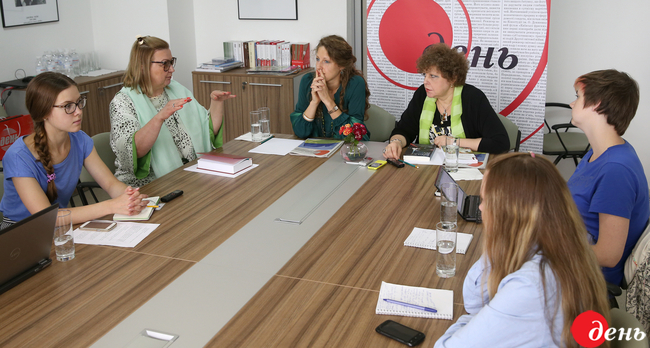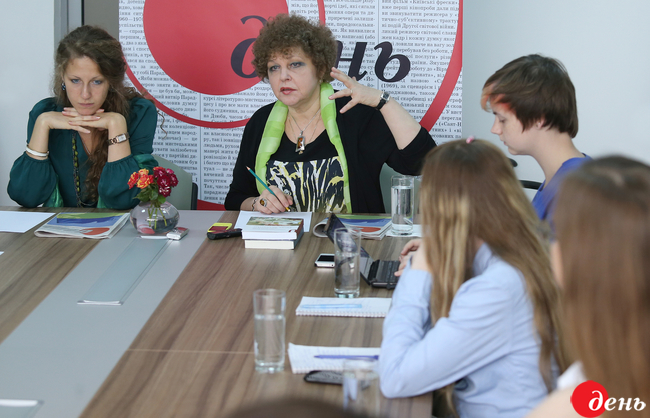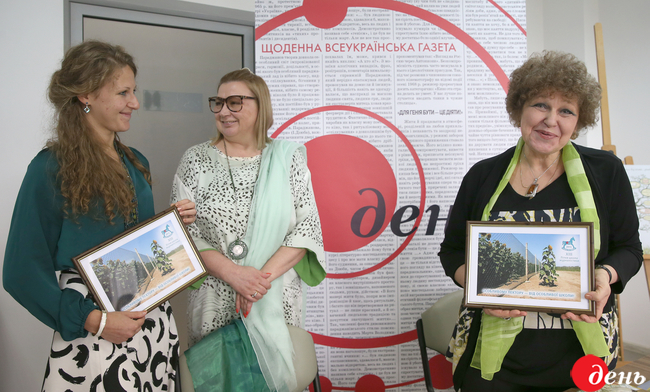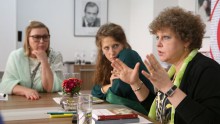The Summer School of Journalism is approaching the finish line, and the last Monday of the summer intensive course saw a traditional meeting with Oxana Pachlovska, writer, winner of the Shevchenko Prize, culturologist, professor of La Sapienza University of Rome and Den/The Day’s author, as well as with Yaroslava Francesca Barbieri, her daughter. The scions of the dynasty of Ukrainian genius, Lina Kostenko, have been attending the School earlier, so the conversation was easy and interesting.
Larysa Ivshyna, editor-in-chief of Den/The Day, presented the lecturers as remarkable authors, who are together with Lina Kostenko described as the “intellectuals in three generations” and “visitors from the future.” The conversation covered some pressing topics: the war in the eastern Ukraine and its impact on the country’s image in Europe, the volunteers, the role of intellectuals in the revival of the state, the stereotypes of the globalized world.

The famous writer Oxana Pachlovska warmly welcomed the participants of the Summer School: “It is a family meeting, as we share the emotional space, the space of ideas and hopes. The most important thing is that you form the bulk of Ukrainian future. You are visitors from the future too. Everyone who critically perceives the world today and who is not afraid to accept its reality is the visitor from the future.”

Amid the dramatic processes in Ukraine Oxana Pachlovska notices some encouraging signs of improvement, but she is also convinced that building a European country requires hard work on a daily basis: “Historically speaking, Ukraine has entered the extreme mode now. Euromaidan, the Revolution of Dignity was a watershed event that changed the course of Ukrainian history and the European geopolitics; it changed the vectors of the democratic civilization. For the first time Ukraine has expressed itself not only in the voice of a few intellectuals, who were often lost in the crowd, but in the will of the society. And this is the main criterion of democracy today, as well as our principal encouraging factor. This means that we have a core for the future that begins to create a new substance of society,” says the lecturer. “But due to all the phenomena being extreme, there is a danger of squandering the potential. Being a European person, building Europe in you and around you is a daily job, in its psychological and emotional sense. We must engage in dialog with Europe, keeping in mind how did it look like a thousand years ago and what it would be like in time.”

Europe knows almost nothing about Ukrainian history, and proving that Ukraine is an independent state is difficult, says Yaroslava Francesca Barbieri: “One has to explain in the West, that carrying a small flag on you is not nationalism, it is an attempt to prove that the country from which I come is an independent political and cultural space. There are stereotypes. And it is also a problem of knowledge taught in the universities. I studied for the bachelor’s degree in philosophy, and there was a required course of modern history. I had to learn the ruling dynasties across the entire Europe since the end of the 15th century. But Ukraine was only represented with some three lines about Bohdan Khmelnytsky. And that’s all. A meager three lines of text in a thousand pages, and no maps as well.”

Dmytro PLAKHTA, Ivan Franko Lviv National University:
“I was anxious to meet Oxana Pachlovska. Why? One time I needed not only to read her book Ave, Europa! but to take notes on it. It is a fundamental work about Ukraine’s cultural reintegration with Europe as a precondition for its political integration. However, our country has undergone crucial changes since 2008, the time of publication of this book. So, I was extremely interested to hear the opinion of Oxana Pachlovska in the wake of the present circumstances. And her daughter, Yaroslava Francesca Barbieri did not just complement the mother’s opinions, but had presented a separate, independent, and extremely interesting vector in the discussion. After all, it’s two different generations. In particular, I was impressed by how Ms. Yaroslava Francesca illustrated her reflections with various examples from her own experience of living abroad.”

Tetiana LITVINCHUK, Taras Shevchenko National University of Kyiv:
“The talk about changing the image of Ukraine abroad, the entry of Ukrainian literature into the worldwide context, the current situation in the field of global security and many other topics was long, but the time had passed quickly. I was interested in the idea of Oxana Pachlovska that the volunteers are one of the most encouraging signs for Ukraine, because democracy is based on the self-organization of society. I am glad, that the Summer School provided the opportunity to talk with such interesting people.”







